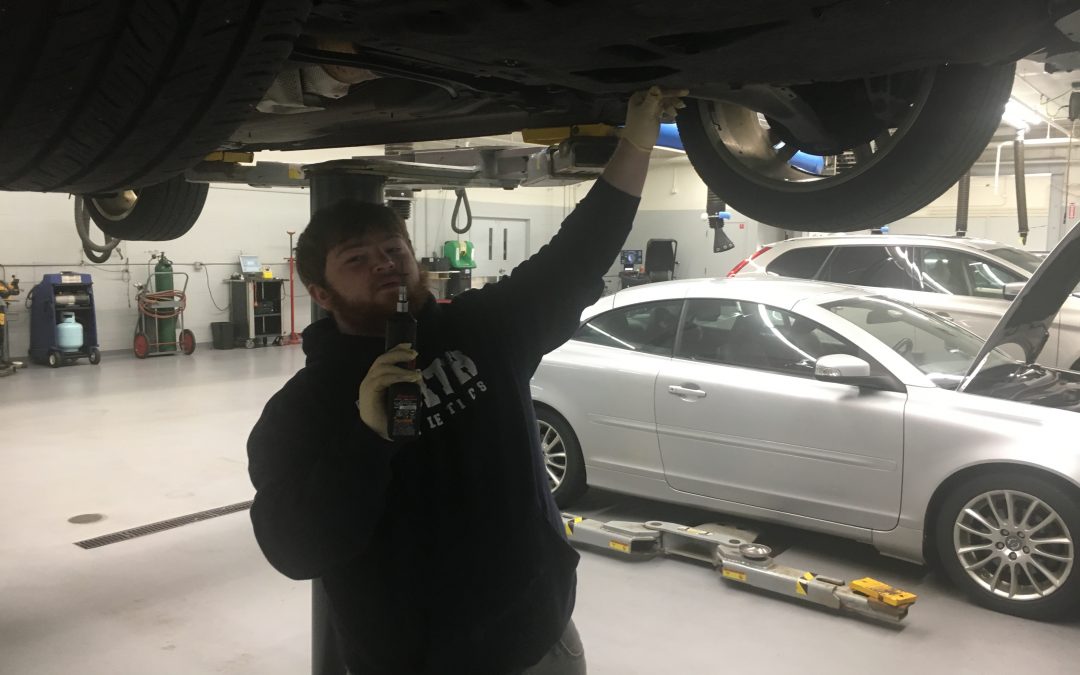
May 30, 2019 | Internships, Programs
While we live in a digital age, there is no substitute for hands-on, work-based learning, which is why staff at Nashua Technology Center (NTC) are pushing to ramp up internships in its Automotive Technology program.
Citing approximately 400 job openings for automotive technicians in the state, NTC Director Amanda Bastoni said it is not enough, however, to offer just any kind of internship to students or industry partners.
“We used to send all of the students out on internship for a full semester, but that model wasn’t working,” she said. “It may have been successful at one time, but dealers started saying that kids weren’t showing up and it was really hard to manage. We knew we needed to make a change.”
This change consisted in reducing the time for internships to one month. She said students now go out Monday to Thursday and come back on Friday to discuss their respective experiences with the teacher.
“It has worked so well,” said Bastoni, who said a lot of preparation went into this programmatic change.
“Our teacher taught the students how to do job interviews, while I, as CTE Director, had all the kids do a survey,” she said.
This survey consists of questions that relate to the local dealership preferred by students as well as their objectives and commitment level to the internship itself.
“Not all students were allowed to participate,” she said.
Bastoni said she also personally interviews students now and provides feedback regarding their interview skills, all of which helped to determine where to place them.
“We made sure the kids who went into the internships really wanted to make this a career,” she added.
Students appreciate the internship model, too.
Senior Christian Belonga, who currently interns at MacMulkin Chevrolet in Nashua, said his internship has helped him realize what it would actually be like to work in the field.
“I like the placement because it gives me that real world experience and it is hands on,” he said. “I have quit my job at Market Basket and now want to work with cars in dealerships.”
Senior Jordan Smith just received a job offer from Tulley Buick GMC.
“I love working with the guys there — I feel absolutely prepared,” he said. I have been doing tires, exhaust, oil changes. Without this class, I wouldn’t know what I wanted to do after school.”
As for how it benefits industry partners, Bastoni said it not only provides dealerships with immediate help, it helps build a pipeline for future employment.
“It gives the dealers a chance to see if the kids are good fit,” she said. “It helps establish a nice relationship between dealers and students.”
According to Bastoni, the effort put into revamping their internship model within Automotive Technology reflects a statewide trend at all CTE centers.
“Internships are such a good idea,” she said. “Research tells us that kids that go into an internship are more likely to go into that industry. It is really good preparation.”
The only caveat is that students must recognize that these are places of business.
“We need to make sure when we send students out that we really support them,” she said. “I will continue to personally interview students before they go out until I really feel like a streamline process has been created.”
To learn more about NTC or Automotive Technology, visit https://nsd-schools.nashua.edu.
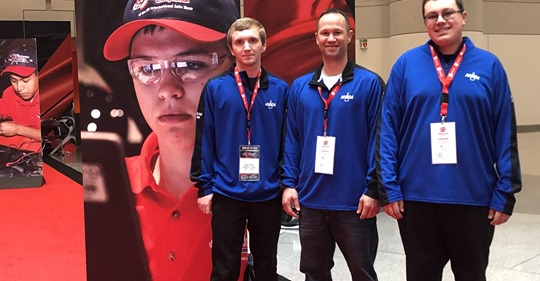
May 16, 2019 | Industry, Programs
Recently, Aaron White and Sheamus Powers, students in Portsmouth High School Career Technical Center’s Automotive Technology program, placed 7th in the nation at the National Auto Tech Championship in New York City.
The achievement, according to Portsmouth Career Technical Education (CTE) Director Diane Canada, helps underscore not just the strength of the program, but its relevancy to – and partnership with – industry.
“We have been accredited by the National Automotive Technicians Education Foundation (NATEF) since 2008,” she said.
This accreditation includes a close working partnership, one that is replicated at all CTE centers across the state.
“I work with all the high school and colleges,” said Jessica Dade, NATEF Assistant Executive Director and Career Coordinator. “I make sure there is a pipeline between the technicians and all the other students that are employed by the auto industry. I help create the pathway from high school and college directly into the industry.
This pathways, she said, leads to hundreds of different opportunities – from auto technician to marketing and accounting.
“It is a fast growing and high-tech industry,” she said. “It is a great career pathway for anyone.”
Such support from NATEF as well as from the New Hampshire Automobile Dealers Association (NHADA) is critical, according to David Lily, who teaches in Automotive Technology at Portsmouth High School.
“With support from the NHADA and the NH community college system, our students have everything they need to start a successful career,” he said.
In the case of White and Powers, this career has a boost from NHADA, which awarded them scholarships as a result of their success at the National Auto Tech Championship.
In the case of White, his scholarship will go toward his degree at the Toyota T-Ten Program at Lakes Region Community College. Powers’ scholarship will be applied toward covering the costs to take the Ford Asset Program at Manchester Community College.
They are both working at NHADA member stores.
“Sheamus is at Hampton Ford and Aaron at Toyota of Portsmouth,” said Dade, who said it is a huge honor for everyone involved in their respective success.
“They are rated within the top 14 auto students in the country,” she said. “It shows that hard work and determination can really pay off. It really humbles you when you see 18 year-olds work so very hard. It is very rewarding seeing it come full circle for them.”
Lilly agrees and said he hopes one takeaway from his students’ accomplishment is a deeper understanding as to what takes place in CTE in general and his program in specific.
“People who are not aware of what current CTE programs offer don’t realize what high level training students are receiving,” he said. “It’s not only from a technical aspect on the cars, but also using the repair software and the technical reading and writing involved.”
He said students are problem-solving every day using industry tools and resources in Automotive Technology at Portsmouth High School Career Technical Center.
“The thought that students are just learning to change oil and tires could not be further from the truth,” he said.
To learn more about Portsmouth High School Career Technical Center, visit portsmouthcte.com.
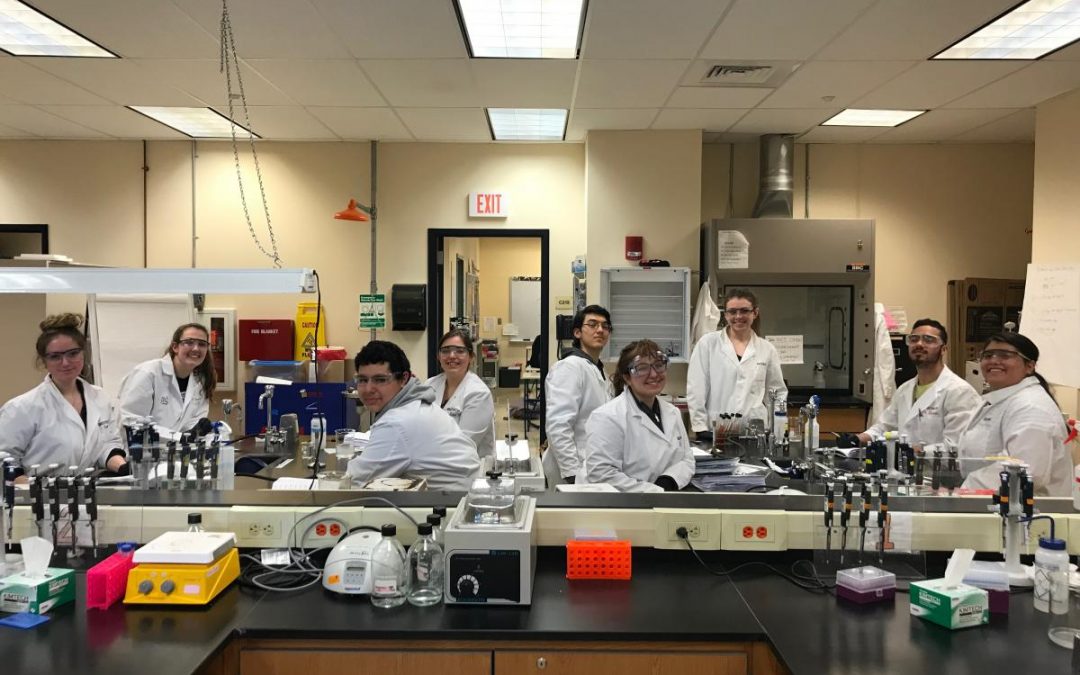
May 6, 2019 | Achievements, Programs
Advanced CTE recently recognized the top eight Career Technical Education (CTE) programs of study with the Excellence in Action Award. These programs represent the best of CTE, with each providing clear pathways into college and careers, rigorous academic and technical coursework, strong industry partnerships, and effective work-based learning experiences that offer opportunities for career exploration and subject-matter mastery.
The Biotechnology program of study at Nashua High School North was launched in 2003 to provide learners with rigorous and integrated academic and technical coursework in the biotechnology field. Throughout the two-year program, learners master advanced laboratory techniques most in demand for medical and scientific careers, such as analyzing cell structures, DNA extraction, molecular cloning, chromatography, protein purification and data collection. Learners demonstrate an understanding of the skills they’ve learned by completing a capstone project their first year and a research project their second year. Through dual credit courses with Great Bay Community College, Biotechnology learners can earn up to eight college credits, creating a seamless transition to postsecondary education.
read article
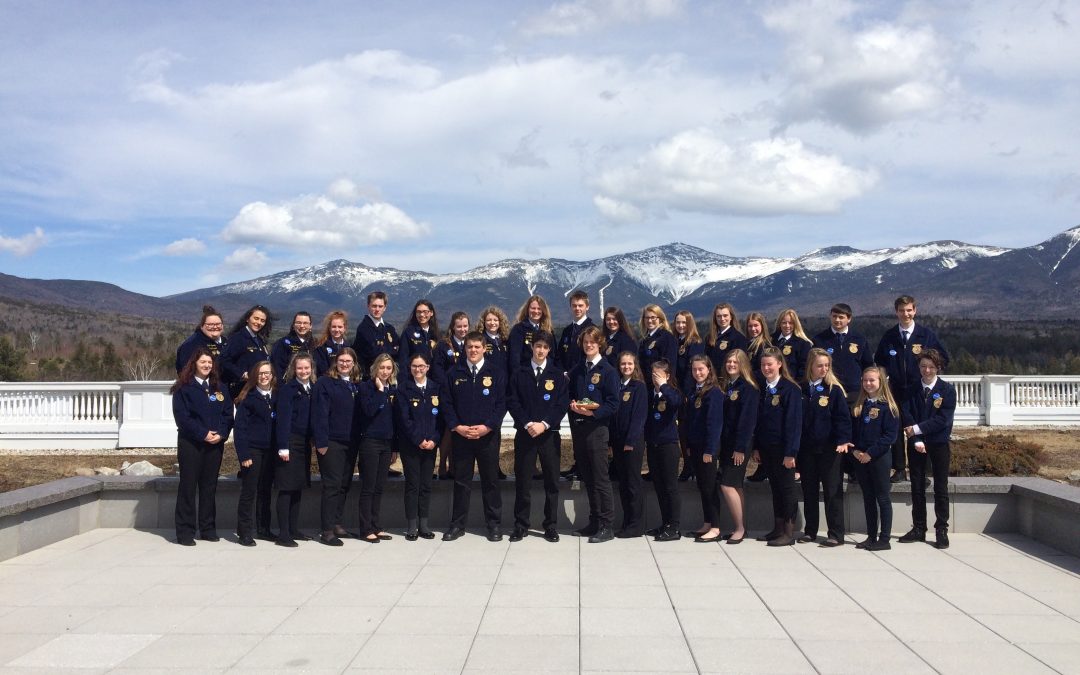
May 1, 2019 | Leadership, Programs
Recently, Margaret Callahan, principal at Seacoast School of Technology (SST), was awarded the Honorary State Future Farmers of America (FFA) degree in recognition of her support and dedication to agricultural education students in New Hampshire.
Acknowledging she was “overwhelmed” and “stunned” by the accolade, Callahan said the real story is the strength of the Animal & Plant Science program at SST.
“It consistently has one of the highest enrollments of any program in the school and the longest waiting list,” she said. “It is extremely popular and we have an incredible teacher in Anne DeMarco.”
It is a program, said Callahan, she has long supported.
“They work hard and they believe in what they are doing and they have a great teacher, so it just makes sense to support it,” she said.
In speaking about the program, she noted one of its most important aspects is student involvement in various fairs and competitions that test their respective skills and knowledge.
“We typically bring 70 kids to the Deerfield Fair, and every one of those students is going to compete in something, so it is very much a business trip for them – it is serious stuff,” she said.
She said students in Animal & Plant Science also typically earn spots at the Eastern State Exposition in the fall in Springfield, Massachusetts. She described it as “a huge agricultural event.”
“ I have even been to the national competition with them and I typically go to the Granite State FFA Convention every year,” she said.
This year, SST FFA Members of the program won 15 state titles at the 89th Granite State FFA Convention. In addition to the 15 state titles, other highlights included 39 students participating in the event. Jenna Marston, president of the SST FFA, won the Outstanding Chapter Officer Award, while Stephanie Gablosky won the Wilbur H. Palmer True Grit Award.
“It is a great program and the kids are amazing,” she said.
According to Callahan, another key aspect of the program is the FFA itself.
“Through FFA events, students are learning not only how to compete, but leadership, which is related to all of those skills learned in competition,” she added.
Callahan said she hopes the takeaway by the general public regarding her award is that agricultural education is alive and well in the state of NH. She said she also wants the general public to understand the value it provides the local economy.
“Not enough people know about FFA or agricultural education in the state,” she said. “I want people to know FFA and agricultural is not something from the past. It is about our future. These students are all learning about the future of agriculture and the scientific side of everything.”
She cited examples of current work by students as consisting of artificial insemination on cows, aquaculture, aquaponics and hydroponics.
“It is very scientific and important stuff,” said Callahan, who credited DeMarco for her efforts.
“We are really fortunate that we have the teacher we have and that the students are pursuing this education,” she said.
To learn more about Animal & Plant Science at SST, visit https://www.seacoasttech.com/animal-plant-science.

Apr 6, 2019 | Article, Culinary Arts, Hospitality, Programs
On a segment about out of the way lunch spots in New Hampshire, the Chronicle camera crew visited Windows on West Street, the culinary arts restaurant at Milford High School. Comments ranged from acquiring career experience while in high school to great food at a great price. Watch the segment here.
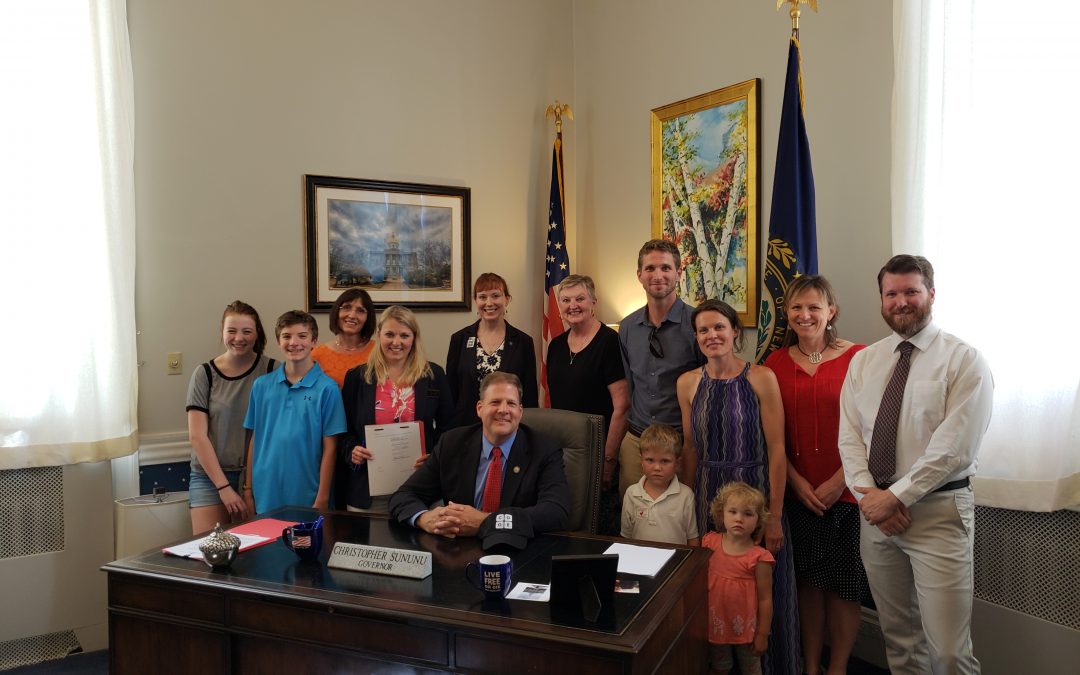
Nov 8, 2018 | College, Impact, Industry, Programs
With the majority of STEM jobs in computing and a projected job growth of 13% compared with 6.5% growth across all occupations, the need for computer science education has never been greater.
It is this need that in part led Creative Computing Challenge (CCC), a five-year program funded by the National Science Foundation, to establish CS4NH. A working group of business/industry, non-profits, and K-12/higher education members collaborating to bring computer science to all New Hampshire K-12 students, CS4NH is working to increase access to and participation in Computer Science educational opportunities.
CS4NH’s Terry Wolf, a NH state legislative representative and vice chair of the House Education Committee, cited “a huge shift” in the public’s understanding of the need for computer science education.
“Not too long ago, people thought Computer Science only needed to be offered at the high school level as an elective,” she explained. “Today, people want kids to be more than consumers of technology. They want them to be the creators, innovators and problem solvers.”
She said this shift in understanding, furthered by advocacy efforts by CS4NH, led to the passage of NH House Bill 1674 earlier this year, which made Computer Science as a core K-12 subject area.
“After listening to a wide variety of stakeholders, adding Computer Science to the definition of an adequate education matched what people are looking for,” she said. “The bill passed with wide bipartisan support in the legislature.”
CS4NH’s Beth Doiron, Director of College Access and DOE programs and initiatives at the community college system of NH, said skills learned in computer science courses help students build basic problem-solving skills.
“Computer science instruction helps students understand how to accomplish tasks more efficiently and help them be better prepared for college in general, regardless of their career or program major choice,” she said.
CS4NH has forged several strategic partnerships, including one with the New Hampshire Tech Alliance, which Executive Director Matt Cookson said makes sense for them in several ways.
“CS4NH goals align perfectly with the goals of our Workforce Development committee and mission of the organization,” he said. “Being able to house the efforts of CS4NH and support its growth and implementation was a logical step as we look to encourage more young people to learn about Computer Science in New Hampshire.”
Judith Burrows, Director of Student Aid at the New Hampshire Charitable Foundation, another CS4NH collaborator, said her biggest takeaway from computer science is the thought processes such a curriculum seeks to encourage.
“Computational thinking is much more than just programming or IT,” she said. “It is foundational for all businesses. It really is the currency that businesses are looking for regardless of the field.”
Citing computational thinking as “the backbone” of various forms of technology, Lori Langlois, Director, North Country Education Services, said Computer Science addresses current and future needs.
“Given the known workforce shortages in NH in computer programming, web development, and other skilled computing fields, CS4NH has an important role in advocating to increase access and participation in CS to foster these career paths for students,” she said.
Langlois said CS4NH is particularly important in her region.
“For the North Country, computer science holds the potential for developing an
innovation economy,” she said. “In order to attract new or expanding businesses, northern NH schools are focusing on computer science with the intention of making visible, the young, energetic, and talented individuals we are developing for a STEM-skilled employee pipeline.”
To learn more about CS4NH, or any related initiative, visit cs4nh.org.
This is the final story of a multi-part series on CCC and the relevance of computational thinking in the classroom and industry in NH.






